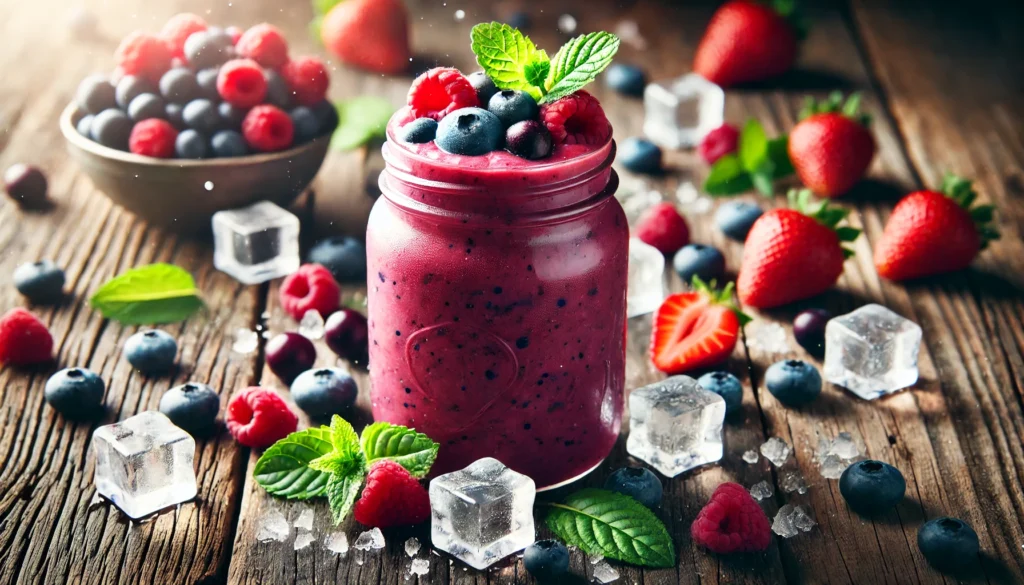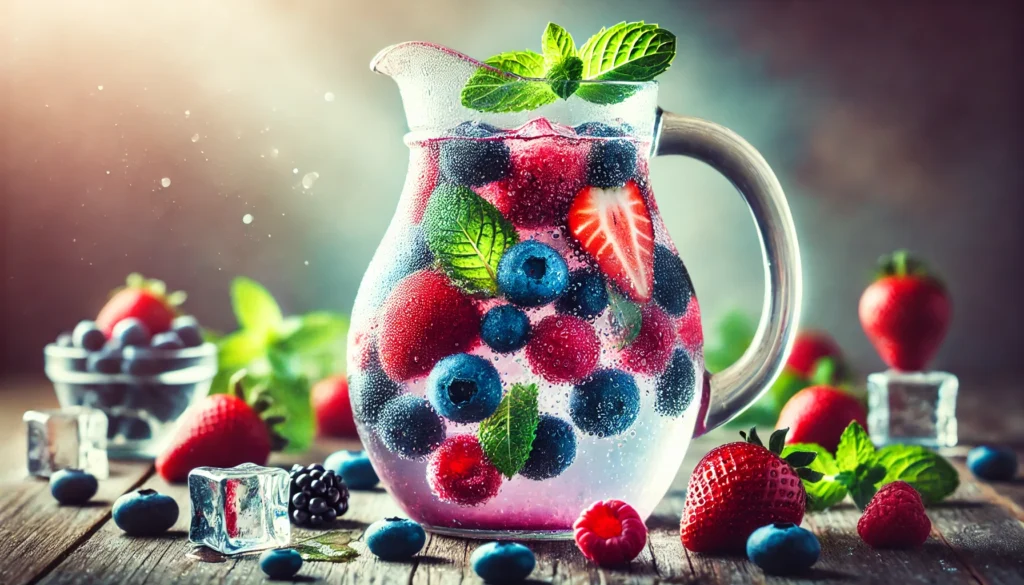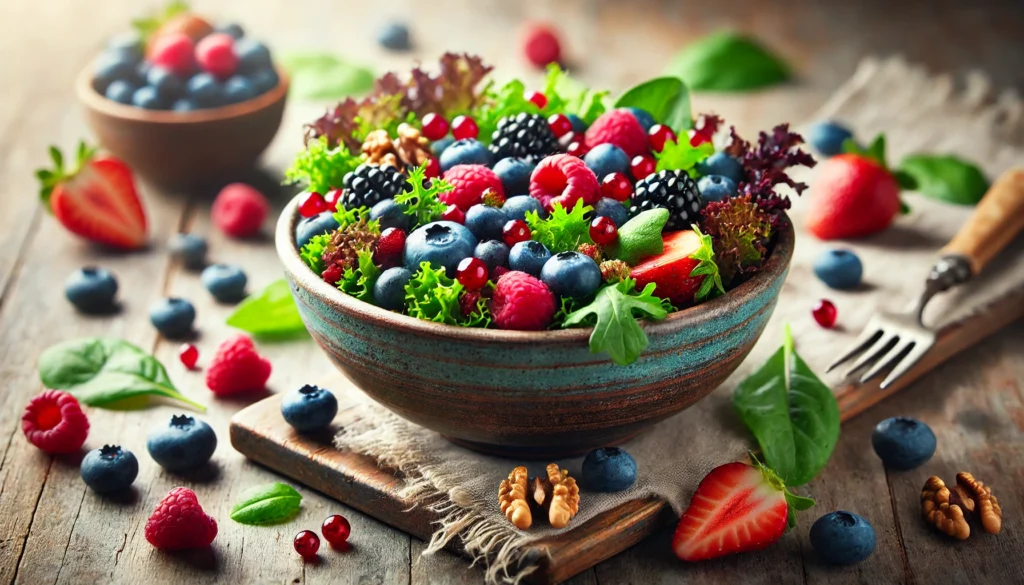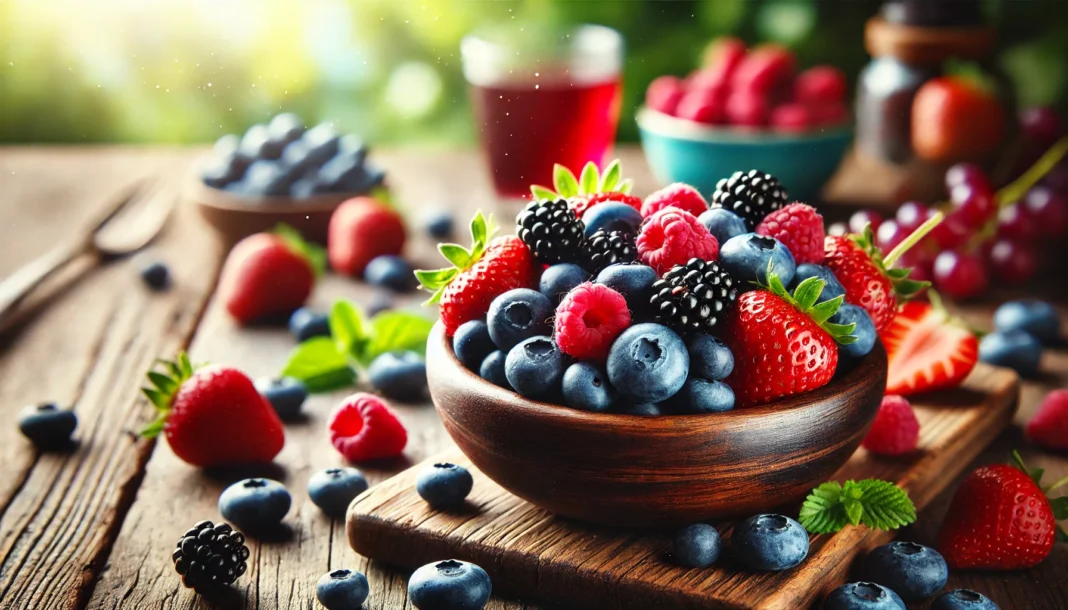The Role of Berries in Detoxification
Detoxification is an essential process by which the body eliminates toxins and harmful substances accumulated through diet, environmental exposure, and metabolic functions. While the body possesses an intricate detox system involving the liver, kidneys, and lymphatic system, certain foods enhance its efficiency. Berries to detox have gained recognition for their ability to support this process due to their high antioxidant and fiber content. Among them, blueberries stand out as particularly beneficial. But do blueberries detox your body? Scientific research suggests that their potent phytochemicals contribute significantly to liver function, cellular repair, and toxin elimination.
The detoxifying power of berries comes primarily from their high concentrations of antioxidants, which combat oxidative stress and inflammation. Oxidative stress is a leading cause of cellular damage, often exacerbated by toxins from processed foods, pollution, and chemicals. By neutralizing free radicals, berries such as blueberries, raspberries, and blackberries help prevent DNA damage and promote cellular repair. These effects are critical for maintaining long-term health and reducing the risk of chronic diseases that may result from toxin accumulation.
Another key factor that makes berries ideal for detoxification is their fiber content. Dietary fiber plays an essential role in digestive health by promoting regular bowel movements, reducing gut inflammation, and preventing toxin reabsorption. Pectin, a type of soluble fiber found in berries, binds to toxins in the intestines and facilitates their excretion. This prevents harmful substances from re-entering the bloodstream, ensuring a more effective and complete detox process. Incorporating berries into the diet can thus optimize gastrointestinal function and enhance overall cleansing.
You May Also Like: How to Detox Your Body: Best Foods and Strategies for a Natural Cleanse
Blueberries: A Superfruit for Cleansing and Renewal
When considering the best berries to detox, blueberries consistently emerge as a superior choice due to their diverse range of bioactive compounds. These small, nutrient-dense fruits contain anthocyanins, flavonoids, and polyphenols, all of which contribute to their remarkable detoxifying abilities. Blueberries are particularly effective at reducing liver inflammation and supporting hepatic function, which is vital for breaking down and eliminating toxins from the bloodstream.
Scientific studies have explored the question: do blueberries detox your body? Research has demonstrated that consuming blueberries regularly can significantly enhance liver enzyme activity, which accelerates the breakdown of harmful substances. The liver relies on a two-phase detoxification system, where toxins are first converted into less harmful compounds and then excreted. Blueberries facilitate this process by upregulating detoxification enzymes, particularly glutathione S-transferase, a crucial enzyme involved in cellular defense against toxins.
Furthermore, blueberries play a crucial role in supporting gut health, an often-overlooked aspect of detoxification. The gut microbiome, which consists of trillions of bacteria, directly influences immune function and toxin elimination. Blueberries contain prebiotic fibers that feed beneficial gut bacteria, promoting a balanced microbiome and preventing harmful bacteria from proliferating. This, in turn, reduces systemic inflammation and enhances the body’s ability to process and remove toxins efficiently. A well-functioning gut microbiome ensures that detoxification occurs smoothly and effectively, reducing the burden on the liver and kidneys.

Raspberries and Blackberries: Aiding in Toxin Elimination
Beyond blueberries, other berries to detox include raspberries and blackberries, which provide unique cleansing benefits. Raspberries are rich in ellagic acid, a powerful antioxidant that has been shown to protect the liver and promote cellular regeneration. The liver is one of the body’s primary detox organs, responsible for processing toxins from food, alcohol, and medications. By enhancing liver cell repair, raspberries help ensure optimal detoxification function.
Blackberries, on the other hand, contain an impressive array of polyphenols that aid in cardiovascular and digestive detoxification. Polyphenols support blood vessel integrity, preventing toxins from causing damage to arterial walls and reducing the risk of circulatory inflammation. Blackberries also contain high levels of vitamin C, which is essential for collagen production and tissue repair. Since detoxification involves cellular renewal, maintaining adequate vitamin C intake through blackberry consumption contributes to improved skin health and wound healing.
Both raspberries and blackberries also offer a significant amount of dietary fiber, which plays an indispensable role in detoxification. Fiber assists in flushing toxins from the digestive tract by promoting regularity and preventing stagnation in the colon. When waste material lingers in the intestines for too long, toxins can be reabsorbed into the bloodstream, leading to systemic inflammation. By supporting healthy digestion, these berries help ensure that toxins are expelled efficiently and consistently.

Strawberries: Enhancing Detoxification Through Antioxidants
Strawberries, another widely recognized detox-friendly fruit, offer a potent combination of vitamin C, manganese, and folate, all of which contribute to detoxification. Vitamin C is especially crucial in neutralizing free radicals and promoting the production of glutathione, one of the body’s most important detoxifying molecules. Glutathione plays a pivotal role in liver function, assisting in the breakdown and removal of toxins.
Strawberries also contain quercetin, a flavonoid with anti-inflammatory and anti-toxin properties. Quercetin has been found to help mitigate the effects of environmental pollutants and heavy metals, reducing oxidative stress at the cellular level. Since heavy metals can accumulate in the body over time, leading to neurological and immune dysfunction, incorporating strawberries into the diet provides a natural means of heavy metal detoxification.
Another significant benefit of strawberries is their high water content. Hydration is essential for detoxification, as it ensures that toxins are efficiently flushed out through urine and sweat. Dehydration can slow down detox processes, leading to toxin accumulation. By providing both hydration and essential detoxifying compounds, strawberries act as a comprehensive cleansing food.

Frequently Asked Questions (FAQ) About Berries and Detoxification
1. How do berries to detox support long-term health rather than just short-term cleansing?
Berries to detox not only assist with short-term toxin elimination but also contribute to long-term cellular health and disease prevention. Regular consumption of detoxifying berries enhances liver function, stabilizes blood sugar levels, and reduces chronic inflammation, which are key factors in preventing degenerative conditions. Unlike fad detox diets that may result in temporary benefits, incorporating berries into a daily routine supports continuous detoxification without causing nutrient deficiencies. The polyphenols and flavonoids in berries actively strengthen the body’s natural defenses, reducing the toxic load over time. Additionally, berries’ impact on gut microbiome diversity ensures that detoxification processes remain efficient, making them an ideal long-term dietary component.
2. Do blueberries detox your body effectively on their own, or should they be combined with other foods?
While blueberries possess powerful detoxifying properties, they work best when combined with other nutrient-dense foods that support liver and kidney function. Blueberries provide anthocyanins and polyphenols that protect cells from oxidative damage, but adding fiber-rich foods such as flaxseeds and leafy greens enhances toxin elimination. Hydration is another critical factor; consuming blueberries alongside water-rich foods like cucumbers and citrus fruits ensures that toxins are efficiently flushed from the body. Protein sources such as lean meats or plant-based proteins aid in enzymatic detox processes, preventing muscle breakdown during cleansing. A well-balanced diet that incorporates blueberries alongside a variety of whole foods optimizes the body’s detox capabilities.
3. How do environmental toxins affect the efficacy of berries to detox?
Environmental pollutants such as pesticides, heavy metals, and air toxins can increase the body’s toxic burden, making dietary detoxification strategies even more crucial. Berries provide essential compounds that combat the oxidative stress caused by these environmental toxins, but their efficacy can be reduced if the berries themselves contain pesticide residues. Choosing organic or wild-grown berries helps avoid exposure to harmful chemicals that may counteract their detoxifying benefits. Additionally, pairing berries with cruciferous vegetables like broccoli can enhance the body’s ability to break down and eliminate environmental toxins more efficiently. Detoxification is most effective when combined with efforts to reduce toxin exposure through air purification, natural skincare, and avoiding processed foods.
4. Do blueberries detox your body from heavy metals and pollutants?
Yes, blueberries play a significant role in detoxifying the body from heavy metals and environmental pollutants due to their high antioxidant content and fiber-rich composition. Blueberries contain pectin, a type of fiber that binds to heavy metals in the digestive system, preventing their absorption into the bloodstream. The flavonoids in blueberries also enhance liver detox pathways that break down and eliminate pollutants. However, pairing blueberries with sulfur-rich foods such as garlic and onions can further enhance metal detoxification. Regular consumption of blueberries, alongside a well-rounded diet, can support the body’s ability to process and remove heavy metals effectively.
5. How do berries to detox impact mental clarity and cognitive function?
Berries to detox not only cleanse the body but also play a significant role in supporting brain health and cognitive function. The antioxidants in berries, especially anthocyanins, reduce oxidative stress in the brain, which can improve memory and focus. Studies suggest that individuals who regularly consume blueberries and other antioxidant-rich berries experience slower cognitive decline and better neurological resilience against conditions such as dementia. Additionally, the gut-brain connection means that detoxifying the digestive system with fiber-rich berries can improve mental clarity and mood stability. By reducing inflammation and enhancing neuroprotection, berries serve as a natural way to maintain sharp cognitive function over time.
6. Can berries to detox support skin health and promote a clear complexion?
Yes, berries to detox are particularly beneficial for skin health, as they help eliminate toxins that contribute to breakouts, dullness, and premature aging. The vitamin C content in strawberries and blackberries supports collagen production, which maintains skin elasticity and firmness. Blueberries, rich in anthocyanins, protect against environmental damage from UV rays and pollution, reducing the risk of hyperpigmentation. Additionally, the fiber in berries aids digestion and prevents toxin buildup in the intestines, which is often linked to skin inflammation and acne. Drinking antioxidant-rich berry smoothies alongside staying hydrated can lead to a clearer, more radiant complexion over time.
7. Do blueberries detox your body faster when consumed in juice or whole form?
Whole blueberries are more effective for detoxification compared to blueberry juice because they retain their fiber content, which is essential for binding and eliminating toxins. While blueberry juice provides a concentrated source of antioxidants, it lacks the fiber necessary for optimal gut health and toxin removal. Consuming whole blueberries allows for a slower release of nutrients, promoting sustained detox support throughout the digestive system. Blending blueberries into a smoothie with other detoxifying ingredients such as chia seeds and spinach can offer both fiber and antioxidants in an easily digestible form. However, store-bought juices with added sugars may counteract detox benefits and should be consumed cautiously.
8. How do seasonal variations affect the detoxification potential of berries?
The nutrient density of berries to detox can vary depending on the season, with freshly harvested berries containing higher levels of antioxidants and phytonutrients. Berries picked at peak ripeness—usually during summer months—have the highest concentrations of anthocyanins and polyphenols, making them more effective for detoxification. However, frozen berries retain most of their detoxifying properties and can be a great alternative when fresh options are not available. The growing environment, soil quality, and exposure to sunlight also influence the potency of detox compounds in berries. To maximize detox benefits year-round, incorporating both fresh and high-quality frozen berries into meals is a practical approach.
9. Can consuming too many berries to detox have negative effects?
While berries to detox provide numerous health benefits, excessive consumption may lead to digestive discomfort or imbalanced blood sugar levels in some individuals. The high fiber content in berries can cause bloating or gas if introduced too quickly, particularly for those not accustomed to a high-fiber diet. Additionally, while berries have a low glycemic index, overconsumption—especially in juice form—can still contribute to elevated blood sugar levels. Moderation is key; consuming a variety of detox-supportive foods alongside berries ensures a balanced and effective cleansing process. If any adverse effects occur, adjusting portion sizes or combining berries with protein and healthy fats can help mitigate digestive concerns.
10. What emerging trends are shaping the use of berries for detoxification?
The health and wellness industry is increasingly recognizing the detox potential of berries, leading to innovations in functional foods, supplements, and detox beverages. Freeze-dried berry powders are gaining popularity as convenient, nutrient-dense options for boosting antioxidant intake. Additionally, probiotic-infused berry detox products are emerging, combining the gut-supportive properties of fermented foods with the cleansing benefits of berries. Scientific research continues to explore the role of berries in personalized detox programs, particularly in relation to genetic predisposition to toxin accumulation. As consumer awareness of natural detoxification grows, demand for organic and sustainably sourced berries is expected to rise, shaping future trends in nutrition and wellness.
Conclusion: The Detoxifying Potential of Berries
Berries to detox provide an invaluable source of antioxidants, fiber, and phytochemicals that support the body’s natural cleansing processes. Among these, blueberries, raspberries, blackberries, and strawberries each contribute distinct detoxification benefits, making them essential components of a detox-focused diet. Given their ability to enhance liver function, promote gut health, and neutralize oxidative stress, berries are a powerful and natural means of improving overall well-being.
For those questioning whether blueberries detox your body, the evidence strongly suggests that they play a significant role in reducing toxic load and supporting cellular health. Their ability to boost liver enzyme activity, fortify the gut microbiome, and prevent toxin-induced damage makes them an optimal choice for individuals seeking to enhance their body’s natural detoxification processes.
By incorporating a variety of berries into daily nutrition, individuals can benefit from their synergistic effects, ensuring a comprehensive and balanced approach to detoxification. Whether consumed fresh, blended into smoothies, or added to nutrient-dense meals, berries serve as an effective and enjoyable way to cleanse the body naturally, supporting long-term health and vitality.
superfruits for detox, best berries for detoxification, antioxidant-rich detox foods, gut health and berries, blueberries for liver detox, raspberries and toxin elimination, best foods for cleansing, do blueberries detox your body, natural detox remedies, berries and digestive health, immune-boosting berries, holistic detox methods, fiber-rich detox foods, cellular repair with berries, heavy metal detox foods, berry detox smoothie, polyphenol-rich superfoods, antioxidants and detoxification, natural ways to cleanse, best fruits for liver health
Further Reading:
Recent Studies on Berry Bioactives and Their Health-Promoting Roles
Berry Phenolic Antioxidants – Implications for Human Health?

